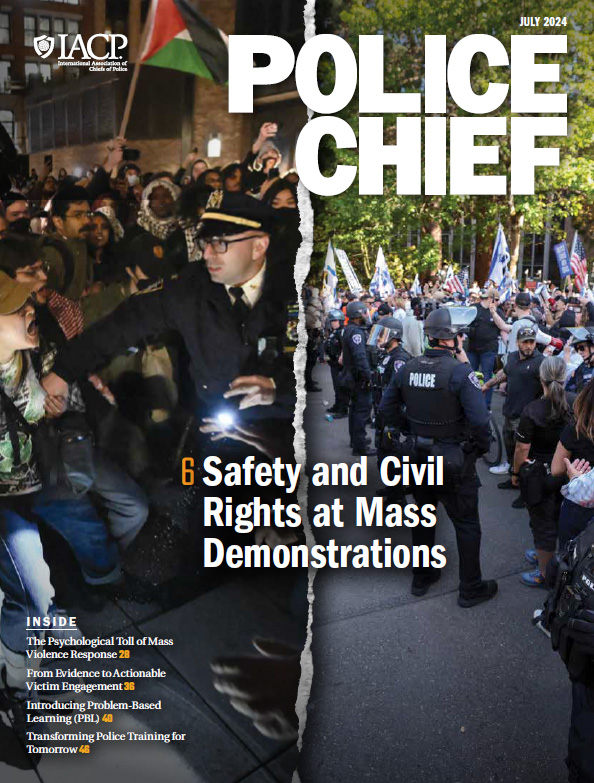As I complete my term as president of the International Association of Chiefs of Police, I want to express my appreciation to each of you for your service as law enforcement professionals and your work and leadership on behalf of our association. It has been humbling and an honor to serve as IACP president.
 This year has brought a characteristically full and productive schedule. The IACP continues to grow, with membership at an all-time high of more than 31,000 members representing 152 countries.
This year has brought a characteristically full and productive schedule. The IACP continues to grow, with membership at an all-time high of more than 31,000 members representing 152 countries.
During my term, I have traveled the world to learn about law enforcement’s global challenges and the solutions undertaken to combat our shared challenges of cybercrime, terrorism, human trafficking, narcotics, and building and maintaining community trust. I traveled to five continents and met with police executives in Canada, France, India, Mexico, Hungary, Israel, United Kingdom, Columbia, United Arab Emirates, and Taiwan, as well as representing the IACP at numerous world regional meetings of law enforcement officials, including INTERPOL, AMERIPOL, and EUROPOL.
As president, I pledged to focus on three initiatives: at-risk adults, police response to persons with mental illness; and building trust and legitimacy in our communities.
We have made progress on all three initiatives, and the IACP will revisit them annually to ensure we are meeting law enforcement’s needs in these areas.
At-Risk Adults
The global population of people aged 60 years and older will more than double, from almost 1 billion today to 2 billion in the next 30 years.
A staggering 1 in 10 at-risk adults are victims of abuse, neglect, and exploitation. In the United States alone, 5 million senior citizens are financially exploited annually. Crimes against the aging continue to increase, but many patrol officers do not have the experience or training needed for effective response. However, patrol officers play a critical role in identifying and protecting potential elder abuse victims.
It is for these reasons I pledged to focus on at-risk adults—to enhance law enforcement’s ability to address crimes committed against these vulnerable adults and provide police with tools to identify, investigate, and prosecute those who victimize at-risk adults. To this end, IACP developed At-Risk Adults Roll Call Training Videos and the Senior Abuse Financial Tracking and Accounting Projects (SAFTA) toolkit.
The roll call videos reflect actual case studies and highlight the roles that patrol officers, detectives, victim advocates, prosecutors, and adult protectives services fill, ensuring law enforcement is prepared to effectively serve victims and successfully prosecute offenders.
Police Response to Persons Affected by Mental Illness
There has been a global failure in the services provided for those affected by mental illness, from the initial, often unanswered, cries for help to the constant cycle of the same people entering treatment or incarceration. Current public policy continues to inflict harm through a lack of community-based services and in-patient resources. The use of force challenges involved in responding to persons with mental illness directly result from this failed public policy.
In 1960, the United States had a population of 150 million and 600,000 in-patient treatment beds for those affected by mental illness. Today, the U.S. population is 330 million, and less than 60,000 beds are available. The tragic reality is that the largest U.S. providers of mental health services are prisons and jails. The three largest facilities in the United States that treat mental illness are New York City’s Ryker’s Island Jail, the Cook County Jail in Chicago, and the Los Angeles County Jail. This problem is not confined to the United States; other countries struggle with the same stark reality. In 1960, Canada had a population of 18 million and approximately 60,000 in-patient treatment beds. Today, there are about 15,000 beds, while Canada’s population has increased to 36 million.
To address this challenge, the IACP developed the One Mind Campaign to ensure successful interactions between police officers and persons affected by mental illness. The initiative focuses on uniting local community services and resources, public safety organizations, and mental health organizations so that the three become “of one mind.” To join this campaign, law enforcement agencies must pledge to implement the four components of the campaign over 12–36 months. These practices include, (1) establishing a clearly defined and sustainable partnership with a community mental health organization; (2) developing a model policy to implement police response to persons affected by mental illness; (3) training and certifying sworn officers and selected non-sworn staff in mental health first aid training or other equivalent mental health awareness course; and (4) providing Crisis Intervention Team (CIT) training to 20 percent of the agency’s personnel.
Presently, more than 400 agencies have taken the pledge and 30 agencies have completed all four steps. In addition to police and sheriff departments in the United States, law enforcement agencies in Casablanca, Morocco; Vancouver and Ontario, Canada; and the Virgin Islands have taken the One Mind pledge.
TRUST Initiative
The goal of the TRUST Initiative is simple: invite law enforcement agencies to join in a commitment to build stronger communities in areas where there might be historical or contemporary obstacles to effective community-police partnerships. IACP’s goal is to develop and provide support and resources to law enforcement leaders pursing a TRUST initiative. This was accomplished through a roundtable discussion and a series of Listening Sessions.
In January 2018, the IACP convened a roundtable of over three dozen participants, including police practitioners; law enforcement leaders; civil rights organizations; civic leaders from legal, advocacy, and other organizations; academic advisers; DOJ representatives; and NFL members or associates. The structured discussion outlined the challenges law enforcement agencies confront in some communities, particularly minority communities, with a focus on historic and recent events that hinder trust between the police and specific groups or community members. Recommendations were developed to reduce or eliminate obstacles to trusting community-police partnerships.
During the summer of 2018, we traveled across the United States to hear concerns from communities directly, along with their suggestions for improving community-police partnerships. Community members were eager to improve their relationships with and confidence in their local law enforcement agencies. Many participants recognized officers’ difficult job and challenges law enforcement faces.
Several consistent themes became evident during the four TRUST Initiative listening sessions, which are detailed in the report released at the IACP 2018 Annual Conference. A singular refrain became clear—trust building requires engagement from law enforcement and community members alike. Each group’s role in the process looks slightly different, but a path forward is not possible without both.
Trust between the police and the community is no different than other relationship—it is an ongoing process of give and take. However, both law enforcement and the community must agree on what a healthy relationship looks like and what factors can damage the relationship.
Advocacy and Criminal Justice Reform
In addition to these initiatives, our legislative efforts on behalf of the law enforcement profession remained a central priority. IACP has been actively working with the U.S. administration, as well as with members of Congress, on a wide range of issues critical to public safety and law enforcement. In particular, we have been actively engaged in discussions related to criminal justice reform. We continue to advocate for the establishment of a National Criminal Justice Commission to conduct a comprehensive examination of all aspects of the criminal justice system and develop a strategic plan to guide public safety for years to come. Over the past year, we have accomplished a lot as an association and a profession. I am privileged to have had the opportunity to lead this amazing organization for the past year and to meet so many of you who embody public service and leadership.
I would like to extend my gratitude to the IACP Executive Board and Board of Directors for their extraordinary leadership and vision. I owe a debt to the IACP staff for their daily support, guidance, and direction on a variety of issues.
Finally, and in particular, I am grateful to my family, especially my wife, Carmen; my friends; and my colleagues at the LaGrange, Georgia, Police Department and the City of LaGrange elected officials and management. Thank you for your unwavering support.
To my friend, IACP First Vice President Paul M. Cell, congratulations to you as you assume the role of IACP president. I am confident in your leadership and your advocacy on behalf of our profession. I look forward to continuing to be actively involved and serving in any way that I can.
Please cite as
Louis M. Dekmar, “Year in Review,” President’s Message, Police Chief 85, no. 10 (October 2018): 6–7.


